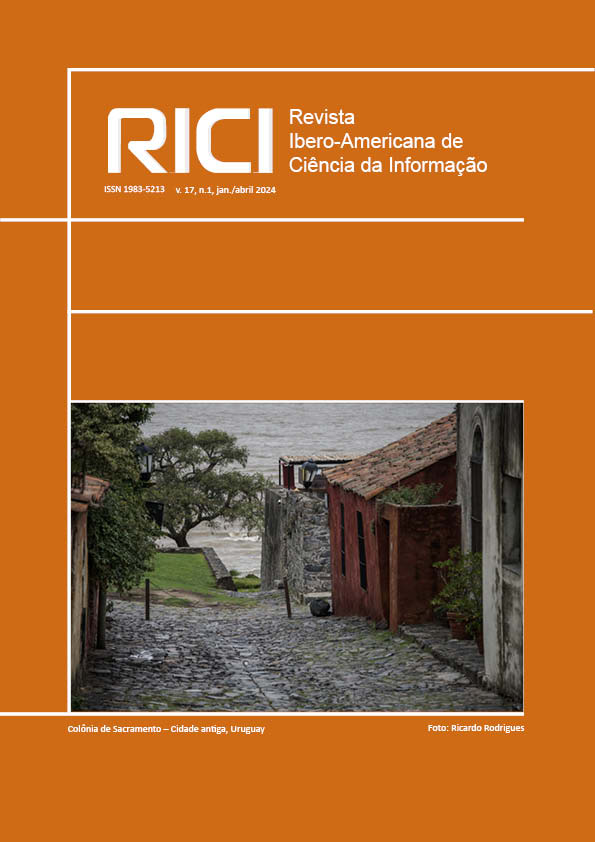Media and information literacy and hate speech: a necessary relationship
DOI:
https://doi.org/10.26512/rici.v17.n1.2024.53067Keywords:
Information Literacy. Media Literacy. Hate Speech. Information Skills., Information literacy, Media literacy, Hate speech, Information skillsAbstract
This research tries to approach the link between media literacy, information literacy and hate speech. It starts from the premise that there is a necessary relationship between the three concepts and that they are essential to avoid disinformation processes and guarantee the training of critical and autonomous individuals to use and evaluate information within a framework of respect for the people’s rights. Under this statement, the aim is to focus the study on two lines of analysis, on the one hand, the review of the guidelines and main definitions of media and information literacy in order to identify components that may be directly related to hate speech and, on the other hand, the identification of research on hate speech and the relationship that these establish with information and media literacy. The theoretical framework that supports the proposal involves the analysis of the concepts and those related to find the meeting points that support the premise and allow the generation of knowledge on the subject. For this, a qualitative methodology will be used that will consider the following tools: review and bibliographic analysis, to know the state of the art; study of the guidelines on media literacy and information literacy to verify if they are addressing the issue of hate speech and if so, in what way. From the study and discussion of the results that arise from the applied methodology, categories of analysis will be elaborated to address the subject and obtain the main results. It is a theoretical paper and intent to systematize part of the knowledge generated on an emerging issue that mainly affects vulnerable groups in our society. At the same time, it is expected to contribute to generate alternatives that prioritize the approach to hate speech from the tools that provide media literacy and information literacy. Finally, it is highlighted that the proposal is part of the generation of a new line of research that will be carried out by the AlfaInfo.uy Research Group of the FIC.
Downloads
References
Association of College and Research Libraries ACRL (2015) Framework for Information Literacy for Higher Education. Revisión de la traducción al castellano: Marco de referencia para la alfabetización informacional en la educación superior, a cargo de Dora Sales (Universitat Jaume I), 2019.
Celik, S. Experiences of internet users regarding cyberhate. Information Technology & People, v. 32, n. 6, p. 1446-1471, 2019.
Chartered Institute of Library and Information Professionals (CILIP). Information Literacy: Definition. 2004.
Civila, S.; Romero-Rodríguez, L. M.; Aguaded, J. I. Competencia mediática contra el odio, la violencia discursiva y la confrontación: Análisis documental y de teoría fundamentada. Temas De Comunicación, n. 41, 2020. https://revistasenlinea.saber.ucab.edu.ve/index.php/temas/article/view/4751
Haasio, A.; Mattila, M.; Ojaranta, A. The Role of Libraries in Avoiding Hate Speech and False Information. Information and Communication Sciences Research, v. 22, p. 9-15, 2018. https://research.abo.fi/en/publications/the-role-of-libraries-in-avoiding-hate-speech-and-false-informati
IFLA Directrices sobre desarrollo de habilidades informativas para el aprendizaje permanente. 2007. Disponible en: https://www.ifla.org/wp-content/uploads/2019/05/assets/information-literacy/publications/ifla-guidelines-es.pdf
Igwebuike, E. U. Media and Information Literacy as a Panacea for National Integration in an Era of Hate Speech in Nigeria. DESIDOC Journal of Library & Information Technology, v. 41, n. 4, p. 240–244, 2021. https://doi.org/10.14429/djlit.41.4.17202
Izquierdo-Montero, A.; Laforgue-Bullido, N.; Quirós-Guindal, A.; Lorón-Díaz, I. Adolescentes frente a los discursos de odio. Una investigación participativa para identificar escenarios, agentes y estrategias para afrontarlos. Madrid: Centro Reina Sofía Sobre Adolescencia y Juventud, Fad, 2022. DOI: 10.5281/zenodo.6581238
Cuevas-Cerveró, A.; Martínez-Ávila, D. Alfabetización informacional crítica: Una corriente política cada vez más necesaria. Anuario Think EPI, n. 16, p. 1–10, 2022. https://doi.org/10.3145/thinkepi.2022.e16a31
Naciones Unidas. Declaración Universal de los Derechos Humanos. 1948.
Sales, D. Definición de alfabetización informacional de CILIP, 2018. Anales de documentación, v. 23, n. 1, 2020. Facultad de Comunicación y Documentación y Servicio de Publicaciones de la Universidad de Murcia. https://doi.org/10.6018/analesdoc.373811
Samy-Tayie, S.; Tejedor, S.; Pulido, C. News literacy and online news between Egyptian and Spanish youth: Fake news, hate speech and trust in the media. Comunicar, n. 74, p. 73-87, 2023. https://doi.org/10.3916/C74-2023-06
Twiss, T. Hate Speech In Libraries: How and How Not to Fight It. Journal of Intellectual Freedom & Privacy, v. 4, n. 3, p. 3-6, 2020.
Unesco. Media and Information Literacy Policy and Strategic Guidelines. United Nations Educational, Scientific and Cultural Organization, 2013. https://unesdoc.unesco.org/ark:/48223/pf0000225606
UNESCO. Standards for Media and Information Literacy Curricula Guidelines. 2019. https://www.unesco.org/sites/default/files/medias/files/2022/02/Global%20Standards%20for%20Media%20and%20Information%20Literacy%20Curricula%20Development%20Guidelines_EN.pdf
Wilson, C.; Grizzle, A.; Tuazon, R.; Akyempong, K.; Cheung, C. Alfabetización mediática e informacional: Curriculum para profesores. 2011. Unesco. http://unesdoc.unesco.org/images/0021/002160/216099S.pdf
Zorrilla Luque, J. L.; García Ruiz, C. R.; Hernando Gómez, Ángel. Discurso de odio en la prensa digital: alfabetización mediática en alumnado de Secundaria. Didácticas Específicas, n. 25, p. 128–149, 2021. https://doi.org/10.15366/didacticas2021.25.007
Downloads
Published
How to Cite
Issue
Section
License
Copyright (c) 2024 María Gladys Ceretta Soria, Magela Cabrera Castiglioni

This work is licensed under a Creative Commons Attribution 4.0 International License.
Copyright Notice
Authors who publish in this journal agree to the following terms:
- Authors retain copyright and grant the journal right of first publication with the work simultaneously licensed under the Creative Commons Attribution License 4.0, allowing the sharing of work and recognition of the work of authorship and initial publication in this journal.
- Authors are able to take on additional contracts separately, non-exclusive distribution of the version of the paper published in this journal (ex.: distribute to an institutional repository or publish as a book), with an acknowledgment of its initial publication in this journal.
- Authors are permitted and encouraged to distribute their work online (eg.: in institutional repositories or on their website) at any point before or during the editorial process, as it can lead to productive exchanges, as well as increase the impact and citation the published work.
















